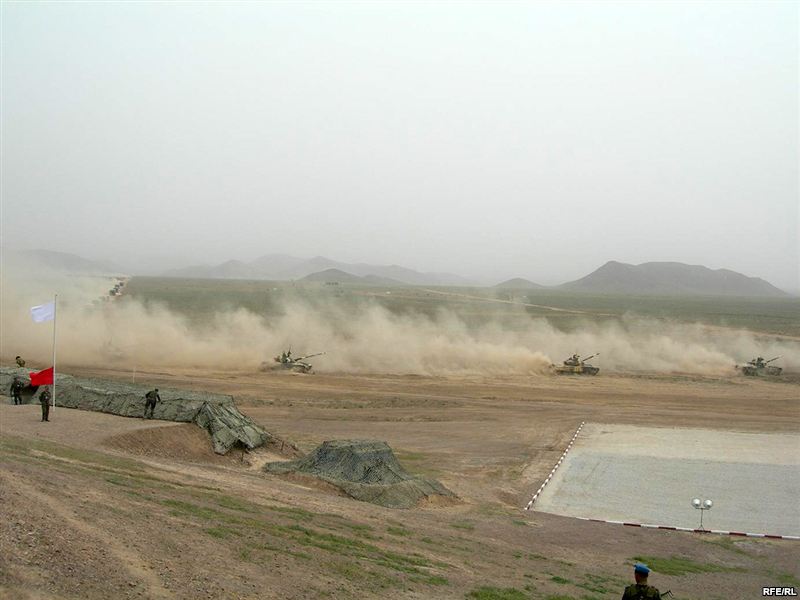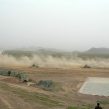
Tsentr 2011 Scenario and CSTO Transformation
Publication: Eurasia Daily Monitor Volume: 8 Issue: 162
By:

Preparations are intensifying ahead of the operational-strategic exercise Tsentr 2011 scheduled for late September in southern Russia, Kazakhstan and Tajikistan. Tsentr 2011 will test the Collective Security Treaty Organization (CSTO) rapid reaction forces (Кollektivnye Sil Operativnogo Reagirovaniya –KSOR) and its possible preparedness to respond to diverse security crises. As in previous KSOR exercises, Uzbekistan refuses to participate. The exercise will be held under the direction of Army-General Nikolai Makarov, the Chief of the Russian General Staff, which Moscow bills as the highlight of the combat training year. Aspects of these preparations and the exercise scenario should give western governments’ reason to question just how far the NATO drawdown from Afghanistan influences security thinking in Moscow or other CSTO members (Krasnaya Zvezda, September 1).
Moscow will scrutinize the functioning of the Central Military District (MD) formed in December 2010, its transition to Joint Strategic Command (obyedinennyye strategicheskoye komandovanie –OSK) to oversee combat operations; command and control (C2) including continued experiments with the long awaited automated system; mobilizing a brigade from the reserves; as well as examining a more varied brigade structure using light, multi-role and heavy brigades. It will serve as a test bed for senior Russian officers seeking to understand how the OSK will function during wartime. In the landlocked MD the role of Russian airpower will prove to be important. Brigade commanders in Central MD confirmed that Russian assets will include air defense, electronic warfare and radiochemical defense. Checks on the participating brigades revealed no systemic failings, and time to remedy individual shortcomings (Krasnaya Zvezda, September 1).
One element in these extensive preparations relates to the military medical service working with civilian agencies, while its overall performance will be evaluated during the exercise. This has meant ensuring that military personnel are vaccinated before arriving in Kazakhstan and Tajikistan, teaching soldiers how to avoid gastric problems and minimize infestations while deployed in the field. Reported issues arising from heat related medical problems, as well as infestations, occurred during Vostok 2010 and the medical service appears determined to avoid any repetition. However, given the high proportion of conscripts used in the exercise, these skills will vanish en masse within only a few weeks as large numbers of conscripts are discharged from service (Krasnaya Zvezda, September 1).
Russian railroad troops have also stepped up preparations for Tsentr 2011. On August 22, the 5th Separate Railway Brigade in Central MD erected a floating bridge across the Yenisey River. This involved laying 5 kilometers of rail track in addition to erecting the 500 meter floating bridge. Also during August, a three-day command-staff drill was staged in Central MD allowing officers and civilian personnel in directorates, departments and services to hone C2 and inter-agency coordination. The drill concept and operation of the group of forces was planned and conducted using a range of multimedia resources, including electronic maps, simulating a realistic operational-strategic situation. Automated C2 and digital communications equipment were also tested (Interfax, August 22; Krasnaya Zvezda, August 20).
On August 18, Colonel-General Aleksandr Postnikov the Commander-in-Chief of the Russian Ground Forces visited Central MD to check on the readiness of units earmarked for the exercise. Postnikov met commanding officers within the MD, regional commanders of interior ministry forces, as well as those from the emergencies ministry, the drug control service and other agencies staging Tsentr 2011. He checked the readiness of the Chebarkul training range in Chelyabinsk to host a special counter terrorist element of the exercise and observed combat teamwork training sessions of battalions from the 7th Tank Brigade (Interfax, Krasnaya Zvezda, August 18).
Throughout August, the Russian air force conducted tactical exercises at the Shagol airbase, the largest airbase in the Central MD. Air force pilots rehearsed strikes against ground targets at one of the seven training ranges assigned to the exercise. Colonel-General Vladimir Chirkin, the Commander of the Central MD stressed that the Air Force will conduct “large-scale” operations during Tsentr 2011, featuring as one its key elements (Krasnaya Zvezda, August 20). On August 11, Colonel Igor Gorbul the press secretary to the commander of Southern MD confirmed that 10 ships, 500 servicemen and 50 pieces of armament in the Caspian Flotilla will participate in Tsentr 2011. Russian naval infantry conducted tactical exercises in August including assault landings on the North Caucasus coast, and executing antitank missile launches. The naval grouping also rehearsed mine sweeps in the Caspian Sea; here public comment on the exercise scenario is curiously absent (Interfax, August 11).
Sergey Konovalov assessed the details of the exercise scenario in Nezavisimoye Voyennoye Obozreniye. His sources questioned the strategic value of the exercise and highlighted unusual features of the vignettes in its scenario. Subunits of the Russian military in coordination with other power ministries intend to focus on repelling foreign military aggression. Terrorists will hypothetically seize a city in southern Russia, prompting a military response. Somewhat surprisingly, given comments by Russian officials about the US/NATO drawdown in Afghanistan, a key exercise vignette would witness subunits repelling attacks by reconnaissance-diversionary groups and the aviation of “a hypothetical enemy in conditions of the use of chemical weapons.” Konovalov characterized the reserve mobilization as “large-scale” sending them by rail, aircraft and other forms of transport from distant parts of Russia to the crisis zone. CSTO peacekeeping forces will also participate in the exercise, while Russian airborne forces rehearse inserting troops in Tajikistan (https://www.ng.ru/nvo/2011-08-12/1_terror.html, August 12).
The seemingly absurd reference to a chemical weapons dimension in the exercise, raising questions about the hypothetical enemy, follows similar oddities during Vostok 2010 when officially the Russian navy conducted antisubmarine warfare under the guise of counter-piracy operations. One point must be stressed: this element in the exercise bears no relation to any concern about a future bleed out in Central Asia of a resurgent Taliban. While Konovalov over estimated the reported mobilization aspects, it is worth asking in what circumstances the Russian defense ministry deems it necessary to use a reserve brigade if the brigades formed in 2009 are truly “permanent readiness” units. Equally, such reservists are poorly trained, and would be of limited value in any operational setting. Some question why the construction of the hypothetical “city” seized by terrorists would require the use of the armed forces, since the operation seems better suited to interior troops and Special Forces (Nezavisimoye Voyennoye Obozreniye, August 12).
Those involved in planning military exercises appreciate the need to factor in possible paths to war within a particular strategic environment. A counter-terrorist element in Tsentr 2011 is unsurprising, but the roles assigned to the Caspian Flotilla and especially the Russian Air Force point to non-Taliban related models. Any confirmation of the WMD vignette in Tsentr 2011 may appear absurd, but it raises the issue of the Russian nuclear umbrella within the CSTO. Moreover, it contradicts the assumption by western planning staffs and experts that Russia and Central Asian countries place their main security emphasis on Taliban-linked nightmares. Indeed, Tsentr 2011 may well prove to be a less than subtle warning against the dangers of foreign intervention in CSTO territories. To parody Winston Churchill, Uzbekistan’s reasons for eschewing such security “guarantees” remain a “riddle wrapped in a mystery, inside an enigma,” which few westerners either want or seem able to unlock.




